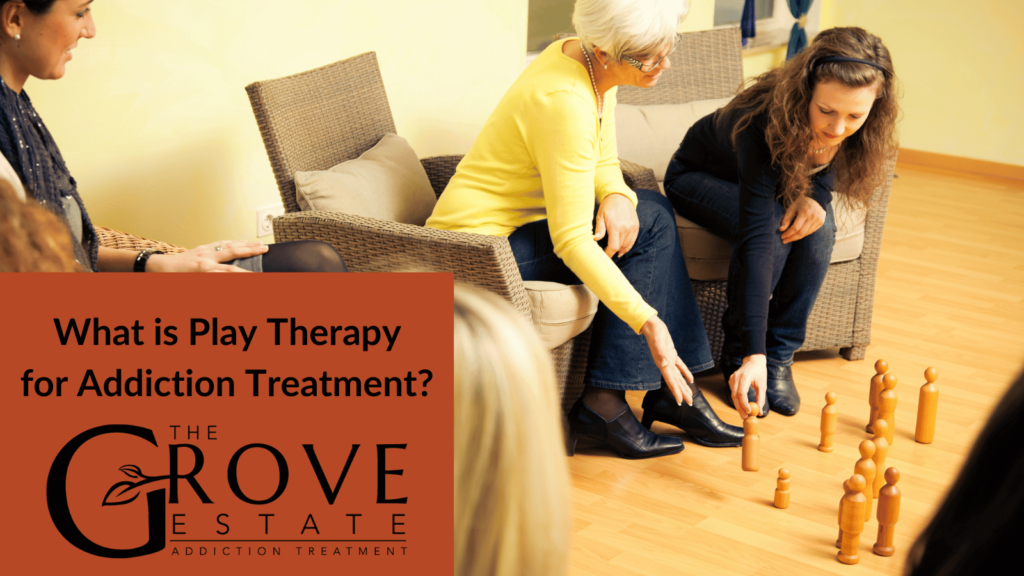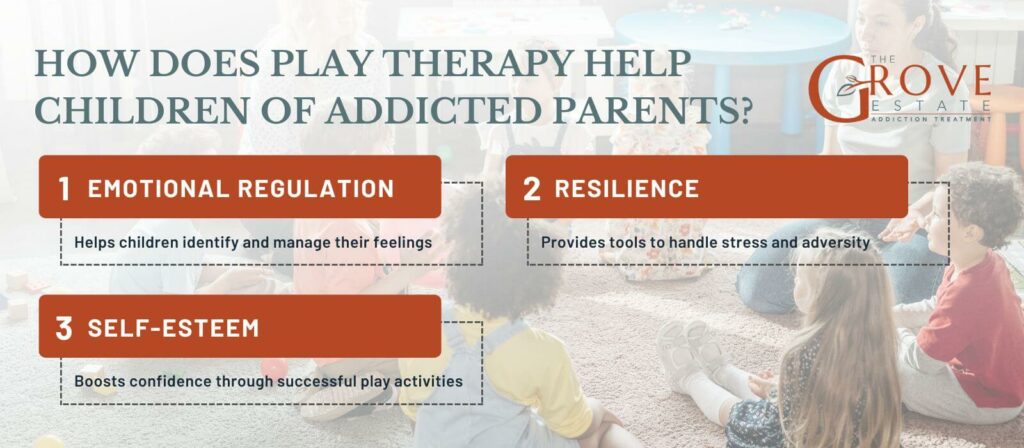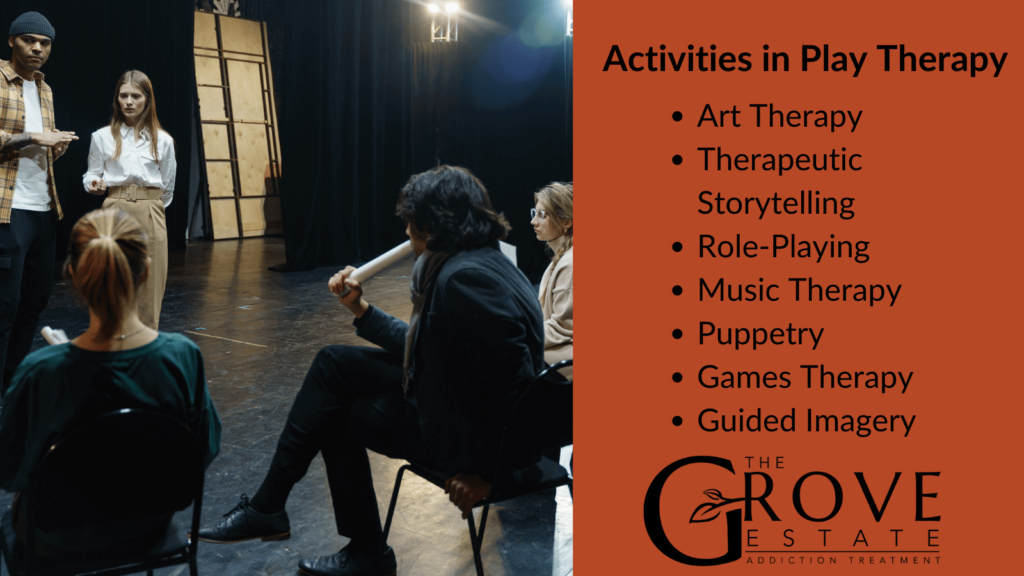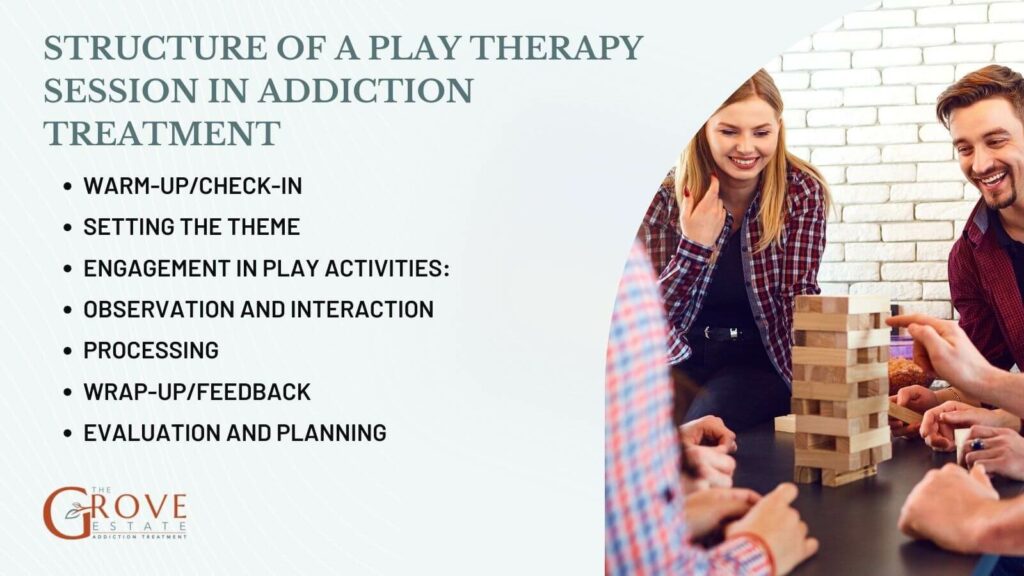Play therapy, originally designed for children, has proven effective for adults in addiction treatment, offering a unique avenue for emotional expression and healing. By facilitating play, individuals can articulate complex emotions and experiences in a non-verbal, creative manner, which is particularly beneficial for those struggling to express themselves verbally. This therapeutic approach allows for the exploration of self, aiding in the understanding and management of addictive behaviors.
According to the Association for Play Therapy, about 71% of participants show positive change through this method. In addiction treatment, play therapy is instrumental in uncovering and addressing the underlying emotional and psychological issues that contribute to addiction, providing a foundation for lasting recovery and improved emotional health.

What Is Play Therapy and Its Role in Addiction Treatment?
Play therapy in addiction treatment uses play-based activities to help individuals confront and process the underlying emotional issues contributing to their addiction. Through methods like role-playing, arts and crafts, and storytelling, patients can explore their emotions, behaviors, and thought patterns in a safe, controlled environment.
This therapeutic approach facilitates emotional healing by allowing individuals to express complex feelings nonverbally, develop coping mechanisms, and gain insights into their addictive behaviors. It helps in building emotional regulation, enhancing self-awareness, and improving social skills, thereby addressing the psychological and emotional foundations of addiction and paving the way for effective recovery.
How Does Play Therapy Benefit Those Struggling with Addiction?
Play therapy aids addiction recovery by allowing individuals to understand their emotions through play, a process that can reveal underlying issues driving addictive behavior. It provides a safe space to explore these feelings without the pressure of traditional talk therapy.
Key benefits of play therapy in addiction recovery include:
- Enhanced Emotional Expression: Offers a platform for expressing complex emotions in a manageable and tangible way.
- Improved Self-awareness: Helps individuals recognize and understand their emotional triggers and addictive patterns.
- Emotional Regulation: Assists in developing coping strategies to manage stress and negative emotions.
- Trauma Processing: Facilitates the safe exploration and resolution of past traumas linked to addiction.
- Relapse Prevention: By addressing the root emotional causes of addiction, play therapy contributes to more sustainable recovery outcomes.

Who Benefits from Play Therapy for Addiction Treatment?
Play therapy in addiction treatment is not one-size-fits-all, it can be tailored to suit individuals across various age groups and life circumstances. While traditionally associated with children, play therapy is equally effective for adolescents and adults, providing a versatile tool for expressing emotions and working through addiction-related issues. These are some examples of individuals who will benefit from play therapy for addiction treatment:
- Children of Addicted Parents: Play therapy offers a crucial intervention for children impacted by parental addiction. It provides a safe environment where they can process their experiences, express emotions safely, and learn coping mechanisms to deal with the chaos addiction brings into their lives.
- Adolescents in Recovery: Teenagers struggling with addiction benefit from play therapy as it allows them to navigate the complexities of their emotions and behaviors in a less confrontational manner. It helps them to explore identity issues, peer pressure, and family dynamics contributing to their addictive behaviors.
- Adults Battling Addiction: For adults, play therapy can tap into unaddressed childhood trauma or unresolved emotional issues that fuel addictive behaviors. It offers a way to explore these past experiences and their impact on current behaviors in a non-judgmental setting.
How Is Role Play Integrated in Group Therapy Sessions for Addiction?
Role play in group therapy for addiction involves participants acting out scenarios to explore and address their addictive behaviors and triggers. This method helps individuals practice coping strategies and understand their own and others’ emotions in a safe environment.
Key benefits include:
- Empathy Development: Understanding different perspectives through role enactment.
- Improved Problem-Solving: Practicing conflict resolution in controlled settings.
- Behavioral Insights: Gaining awareness of subconscious actions and thought patterns.
Role play enhances traditional therapy by providing practical, experiential learning, allowing for the direct application of therapeutic concepts in a supportive group setting.
How Does Play Therapy Help Children of Addicted Parents?

Play therapy aids children of addicted parents by allowing them to express and process their emotions in a safe environment. Through play, they can explore and understand their experiences, helping to mitigate the emotional turmoil caused by parental addiction.
Oftentimes, children have a hard time speaking about their experiences with their parents especially if they are negative. Play therapy offers support and a stable outlet to navigate their complex emotional landscape while allowing therapists a way into the child’s brain through nonverbal communication.
The therapy offers:
- Emotional Regulation: Helps children identify and manage their feelings.
- Resilience: Provides tools to handle stress and adversity.
- Self-Esteem: Boosts confidence through successful play activities.

What are the Key Techniques and Activities in Play Therapy for Addiction Treatment?
Play therapy for addiction incorporates a variety of techniques and activities tailored to help individuals express emotions, confront issues, and foster healing. Here are some of the primary methods used:
- Art Therapy: Involves creative expression through drawing, painting, or sculpting, helping to uncover and address non-verbalized feelings related to addiction.
- Therapeutic Storytelling: Employs narrative to reflect personal experiences, allowing individuals to process and reinterpret their life situations.
- Role-Playing: Provides a stage for acting out real-life situations related to addiction, aiding in the development of new coping mechanisms and interpersonal skills.
- Music Therapy: Uses music to facilitate emotional expression and regulation, offering an outlet for communication and mood management.
- Puppetry: Allows projection of personal experiences onto puppets, enabling easier discussion of sensitive or complex emotions.
- Games Therapy: Engages in structured play, like board or card games, to teach strategic thinking, patience, and social skills.
- Guided Imagery: Employs relaxation and visualization techniques to improve mindfulness and emotional clarity, supporting a vision of addiction-free living.
These techniques in play therapy provide a dynamic and flexible approach to addressing the multifaceted nature of addiction, allowing for personalized and effective treatment pathways.
What are the Challenges of Addiction Recovery through Play Therapy?
Play therapy in addiction recovery faces challenges like engaging adults who might be skeptical of using play as a therapeutic tool and addressing deep-seated traumas that can surface during sessions. It also needs to be effectively integrated into broader treatment plans that include traditional counseling and medical interventions.
To address these challenges, play therapy must be tailored to the individual’s age, developmental stage, and specific addiction issues. Therapists often combine play therapy with other therapeutic approaches to ensure a holistic treatment. Effective integration involves continuous assessment and adaptation of therapy strategies to meet the evolving needs of the individual in recovery.

How Does Play Therapy Work in Conjunction with Traditional Therapies for Addiction Treatment?
Play therapy enhances traditional addiction treatment by providing a creative way to express and explore emotions, complementing the cognitive focus of methods like cognitive-behavioral therapy (CBT). It helps uncover underlying issues that may not emerge in talk therapy alone. By integrating play therapy, therapists can achieve a more comprehensive approach, addressing the emotional, cognitive, and behavioral aspects of addiction recovery simultaneously.
What to Expect from a Play Therapy Session in Addiction Treatment
Participants and their families can anticipate a supportive and creative environment in a play therapy session for addiction treatment, where the individual is encouraged to explore emotions and experiences through play activities. These sessions are designed to be non-threatening, allowing participants to express themselves freely and safely.

A typical play therapy session in addiction treatment might follow this structure:
- Warm-up/Check-in: The therapist begins by establishing a comfortable environment, allowing the individual to settle in and express how they are feeling that day.
- Setting the Theme: The therapist might introduce a theme or goal for the session, guiding the direction of the play activities.
- Engagement in Play Activities: The individual engages in selected play activities, such as sand tray work, art creation, role-playing, or other therapeutic games, relevant to their treatment goals.
- Observation and Interaction: The therapist observes and, at times, participates in the play, noting behaviors, expressions, and themes that emerge, providing insights into the individual’s internal world.
- Processing: After the play, the therapist and individual discuss the session, exploring feelings, behaviors, and revelations that arose during play.
- Wrap-up/Feedback: The session concludes with a summary of progress, discussion of insights gained, and setting goals or homework for continued growth outside of therapy.
- Evaluation and Planning: The therapist evaluates the session’s outcomes and plans future sessions based on the individual’s therapeutic needs and progress.
Progress in play therapy is measured through behavioral changes and emotional growth observed over time. Therapists track improvements in the individual’s ability to manage emotions, communicate effectively, and exhibit healthier coping strategies. Regular assessments and feedback sessions help to gauge progress, adjust therapeutic approaches as needed, and ensure that the therapy aligns with the individual’s recovery goals.
What is the main goal of using play therapy in addiction treatment?
The main goal of play therapy in addiction treatment is to provide a safe and expressive environment where individuals can explore their feelings, behaviors, and underlying emotional issues contributing to their addiction. It aims to enhance self-awareness, promote emotional healing, and develop healthier coping mechanisms.
Can adults really benefit from play therapy, or is it just for children?
Adults can significantly benefit from play therapy. While it originated as a method for treating children, play therapy has been adapted to meet the emotional and psychological needs of adults, especially those dealing with addiction. It offers a non-traditional, engaging way to explore deep-seated issues and emotional conflicts.
How does play therapy differ from traditional talk therapy in treating addiction?
Play therapy offers a more experiential and interactive approach compared to traditional talk therapy. While talk therapy often relies on verbal communication to understand and resolve issues, play therapy uses creative and symbolic activities to express and process emotions, making it particularly effective for those who may find it difficult to articulate their feelings and thoughts.
How long does it typically take to see progress in addiction recovery through play therapy?
The timeframe for seeing progress in addiction recovery through play therapy can vary widely depending on the individual’s circumstances, the severity of the addiction, and their engagement in the therapy process. Some may notice improvements in a few sessions, while others may require a longer period.
What is the role of play therapy in emotional regulation during addiction treatment?
Play therapy offers a unique method for individuals in addiction treatment to explore and manage their emotions. By engaging in play, participants can externalize and process feelings that are otherwise difficult to articulate. This form of therapy supports emotional regulation by providing a creative outlet for stress and anxiety, which are common triggers for substance abuse.
In addiction recovery, the ability to manage one’s emotions effectively is crucial. According to experts, play therapy enhances emotional resilience and coping strategies, making it a valuable component of a comprehensive treatment plan. For more information on how emotional resilience is built through therapy, you might explore animal-assisted therapy in addiction, another form of experiential therapy that aids emotional regulation.
How does play therapy compare to traditional therapy in treating addiction?
Play therapy diverges from traditional therapy methods by focusing on non-verbal expression and interaction. This can be particularly effective for those who find it challenging to engage in more conventional talk therapies due to emotional blockages or trauma. Through play, individuals can safely explore and address these issues, promoting deeper psychological healing and understanding.
Additionally, play therapy sessions typically involve creative activities that encourage patients to express themselves in ways that go beyond words. This can lead to breakthroughs in treatment that might not occur through traditional methods alone. To continue supporting recovery after initial treatment, consider the benefits of an aftercare facility, which can provide ongoing support and reinforcement of coping strategies learned through play therapy.

Share This Post



